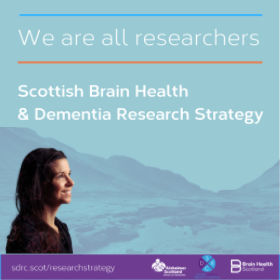 This strategy sets out a positive, shared vision for dementia in Scotland over the next 10 years. It makes clear the importance of a shared vision that is owned by all of us working together to deliver a better experience for people living with dementia, their families and carers. It builds on several years of globally-recognised public policy on dementia in Scotland and commits to ongoing reflection and learning, greater inclusion and delivery from the start.
This strategy sets out a positive, shared vision for dementia in Scotland over the next 10 years. It makes clear the importance of a shared vision that is owned by all of us working together to deliver a better experience for people living with dementia, their families and carers. It builds on several years of globally-recognised public policy on dementia in Scotland and commits to ongoing reflection and learning, greater inclusion and delivery from the start.
It’s called “Everyone’s Story” because it belongs to all of us. How we understand, support and see dementia impacts everyone, regardless of gender, ethnicity, additional disability or age. Across all settings, at all stages we must embed and enable empowerment, inclusivity and citizenship. That will require us to listen and respond more to the needs of people from different communities and backgrounds across Scotland.
We know that people with dementia still face many challenges, which are often rooted in poor understanding, inequality or stigma.
This strategy recognises the need to develop our collective understanding of dementia and build an understanding of brain health over time. That may challenge some attitudes on what dementia is and raise questions about the best ways to enable or deliver support, but it also creates opportunities for doing some things differently and making new connections. That has to include ways to address long waits experienced by some people needing a diagnosis, as well as ensuring more consistent access to good quality post diagnostic support, co-ordinated care that supports people to live the best life possible and access to palliative care.
But over time it will also require a focus on ways to ensure dementia services and supports feel more integrated into systems and communities.
The best way to deliver better experiences for people is to include them in policy design and delivery. Scotland has a strong record of working closely with people with lived experience of dementia to inform policy and delivery. This strategy – its approach, design and focus takes this work further. Last year, Scottish Government established a National Dementia Lived Experience Panel, drawing membership from different backgrounds, experiences, and places. This Panel has worked alongside local and national government, and with wider partners, to develop this strategy. We are hugely grateful for the time, commitment and expertise shared to date and look forward to continuing to work with the panel as we move into delivery. This document is enriched by their experience and contribution.
Our sincere thanks also extend to the Strategy Advisory Group. Meetings brought together a wide range of people and organisations who helped to inform and agree this vision, alongside the Lived Experience Panel. The group included a range of different voices and expertise, some with differing perspectives but a commitment to collaborate, learn and innovate as we move forward, keeping people and their experiences to the fore. Again, we look forward to continuing to work with this wide range of partners as we embark on delivery.
That commitment to ensuring delivery is our most important priority. Our rolling 2-year delivery plans, which will be developed with national and local oversight, will increase accountability and keep us focused on impact. The first delivery plan will be developed and agreed this year for implementation in 2024-25.
There is no doubt that agreeing and resourcing the first set of priorities for delivery will be challenging given the pressures being experienced across all parts of the system.
Whilst the increased national and local investment in dementia in recent years demonstrates our shared commitment to improving people’s experience, we know we must work with others to maximise the impact of existing spend. We must ensure investment is focussed in the right areas and delivering greatest impact on our priorities. We will make the most of opportunities to align and test improvement as part of wider health and social care reform where that’s appropriate.
We have hard work ahead to deliver on the level of ambition set out in this document. We want to thank every individual and organisation across Scotland who participated in the engagement and development process that has led us to this point. We know that people gave their time and experiences with expectations that change will happen, and it will. We are confident that this 10-year strategy sets the right course for dementia policy in Scotland. The next step is agreeing our plans for delivery. The strategy is everyone’s story, but it only changes things if we each take a role in its delivery.
- Maree Todd MSP, Minister for Social Care, Mental Wellbeing and Sport
- Councillor Paul Kelly, COSLA Spokesperson for Health and Social Care
Listen to our podcast discussing the Scottish Dementia Research Strategy.
Vision
Our vision is of a Scotland where people living with dementia have their strengths recognised, their rights upheld, and where they, their families and care partners/unpaid carers are supported to live an independent life, free from stigma and with person-centred treatment and care, when and where they need it.
The difference we want to make:
1 Dementia is recognised in public health and in practice as disease of the brain that affects a person’s whole life and those close to them. Diagnosis can bring significant mental health and wellbeing challenges that need to be acknowledged and addressed to ensure a person’s rights are upheld.
2 Policy makers, support and service providers, communities and society all have an understanding of dementia, including the importance of prevention and early detection, and are inclusive of people living with dementia, able to engage and respond confidently and appropriately, creating environments that enable people to live well with dementia.
3 People living with dementia and their care partners/unpaid carers have equity of access to high quality, information and advice, evidence-based treatment, care and support when and where they need it, including dementia-specific palliative care, and have access to practitioners with appropriate dementia care knowledge and skills.
4 The human rights of people living with dementia and their care partners are upheld throughout their dementia journey.
5 People are supported by a skilled and knowledgeable workforce that accesses the highest quality dementia specialist education and training and implements evidence-based, including trauma-informed, practice.
Download the Report

 Print This Post
Print This Post



